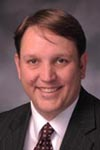JEFFERSON CITY, Mo. – SJR 39 opponents released a memorandum from Husch Blackwell, in Kansas City, that claims the language in the resolution is overly broad and could result in wide-ranging religious protections beyond the clergy, florist and baker examples supporters frequently cite.
But while amendments have been proposed, the resolution’s opponents also say they don’t want to amend the bill to clean up the language because it would still be a bill they can’t support.

“I’ve got 6 pages of very meaty legal argument of why numerous sections are not acceptable. Of the 20 amendments I’ve looked at, I haven’t seen one yet that addresses every issue. And so, you’re left with the question of, ‘do you amend something to make it slightly better?’” said Rep. Jeremy LaFaver, D-Kansas City, who distributed the memo. “I don’t know if there’s an amendment that could make this palatable based on the overwhelming legal information that continues to pour in.”
SJR 39’s supporters though say that this is just another tactic opponents are trying to use to derail the bill. Rep. Paul Curtman, R-Union, said this was another example of opponents “hyper-inflating” a bill’s flaws.
“When I read the bill, I certainly don’t see those concerns,” said Curtman, who hadn’t yet seen the memo.
Husch Blackwell was asked to “identify problems that could impede [SJR 39] from achieving its goal or which may implicate constitutional infirmities.” The firm’s memo found that much of the bill’s language was overly broad, including the terms “individual” and “penalty.” It also found language that says, “personally be a participant,” could broaden the number of people who could decline to offer services.
“If the intent of Section 36.1(4) is to shield individuals who provide goods/services of ‘expresisional or artistic creation,’ the ‘personally be a participant’ language should be removed, as it serves no purpose other than to significantly expand the types of goods/services protected by the section to a point well-beyond good/services of ‘expressional or artistic creation,’” the memo read.
The memo also said a penalty under the resolution could include almost anything.
“Under these Sections, a penalty would thus include anything that may fall under the definition of the word, to include anything from an employee reprimand to a criminal proceeding.”
LaFaver argued that the concerns highlighted in the memo indicate the resolution is not as narrowly tailored as the its supporters say.
“It’s clearly not a narrowly tailored bill,” he said. “The fact that one person could come in and craft a bill with whoever he says he drafted it with, and then not accept any amendments after pages and pages and pages of legal arguments against numerous provisions in there. … there’s just so much information that just continues to pour in on this thing.”
He also said that at this point in the process it might be too late to clean up the language.
“Every time we’ve seen an amendment, we’ve said ‘well this doesn’t quite take care of everything.’ I don’t even know at this point that even they can narrow it down to the point where we could support it.”



